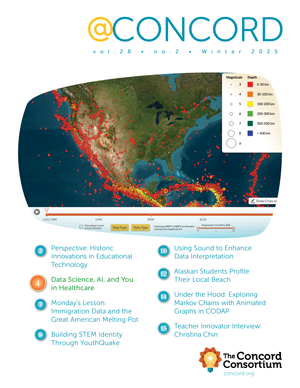News
The Concord Consortium is happy to announce five new projects.
MothEd
The goal of a new National Science Foundation (NSF)-funded collaboration between the Concord Consortium and Michigan State University is to understand how learning experiences and environments can support young students’ participation in authentic science investigations. With practicing teachers, we are co-designing experiences for elementary and middle school students to engage in real-world scientific practices and investigations on local moth ecology. Students work individually and in small groups to construct moth traps and collect data through processes they design and enact. In partnership with entomologists and science educators, students develop and answer questions about local ecological conditions and become genuine producers of knowledge—epistemic agents—within science learning communities. We are studying features and approaches to the co-design of learning opportunities that foster student agency and identifying the ways in which teachers and students negotiate new roles in authentic science investigations.
Boosting Data Science
Boosting Data Science Teaching and Learning in STEM, a partnership between WestEd, the Concord Consortium, and Heller Research Associates, is researching the knowledge and skills middle school teachers need to support students in developing data fluency and help them overcome common roadblocks. We are developing a framework of pedagogical content knowledge for data fluency in middle school that details what teachers need to know and be able to do to support students in becoming data fluent. With a team of co-design teachers, data scientists, and educational specialists, we will use the framework to guide the design of professional learning experiences that include our Common Online Data Analysis Platform (CODAP) for teachers to learn about data science and develop resources for their students. This NSF-funded project will study the effects on both data science teaching and data science learning in the classrooms of teachers who have participated in the professional learning experiences.
Precipitating Change
The new NSF-funded Precipitating Change with Alaskan and Hawaiian Schools: Bridging Indigenous and Western Science While Modeling Mitigation of Coastal Erosion project supports Earth science learning from both Indigenous knowledge and Western-style inquiry. In a coastal erosion curriculum unit that bridges Indigenous and Western science, middle school students apply integrated Earth science, mathematics, and computational thinking. The curriculum is designed with Universal Design for Learning principles, including a multiple-representation glossary,translations for Indigenous languages, and scaffolding to assist students in understanding Indigenous and Western science terms. Project research studies how the approach prepares students to study and address socio-scientific issues.
M2Studio
The Common Core State Standards for Mathematics includes “Model with mathematics” as one of the mathematical practice standards, and notes that students should be engaged in math modeling throughout their education. But moving between the real-world domain and the mathematical domain can be challenging. A new NSF-funded project at the Concord Consortium, Clarkson University, and Pennsylvania State University aims to cultivate mathematical modeling competencies among secondary students by developing and researching M2Studio, a web-based, integrated math modeling environment. In M2Studio, students document their thought processes, uncover and test their explicit and implicit assumptions, and evaluate their solutions against real-world data. M2Studio unites our CODAP data analysis and visualization tool with our SageModeler system modeling tool to support student-generated representations of assumptions, variables, and relationships that are dynamically linked.
FABLES
With WestEd and the University of California Berkeley’s Lawrence Hall of Science, the new Formative Assessment Bundling Literacy and Elementary Science in the NGSS (FABLES) project is developing and piloting a set of classroom-based assessment resources with accompanying professional learning to support early grades teachers in monitoring and enhancing students’ integrated science and literacy learning. FABLES will include a suite of innovative Next Generation Science Standards-aligned assessment tasks, rubrics for interpreting student performance, teacher practice guides for engaging in classroom instruction that is informed by student learning, and professional learning for teachers. This Institute of Education Science (IES)-funded project aims to help teachers envision what evidence of NGSS learning “looks like” with an additional lens on assessing literacy in the context of STEM.
